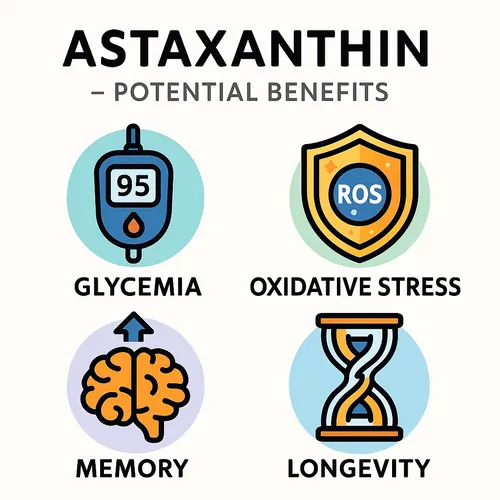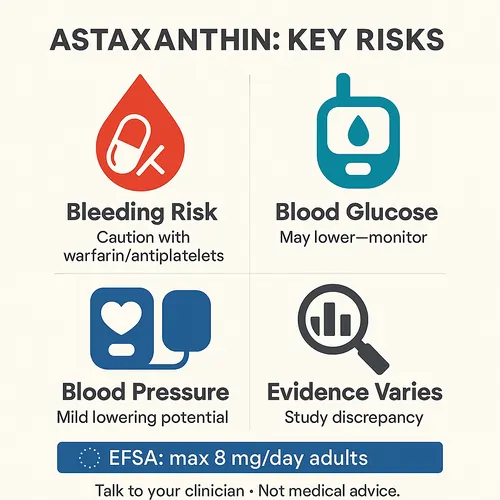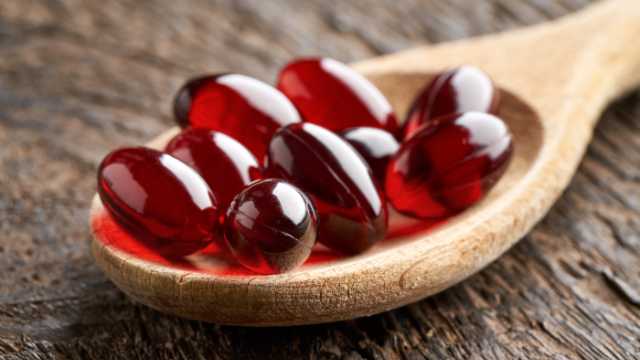Astaxanthin Dangers
Astaxanthin may have many health benefits, but what are the dangers of Astaxanthin supplements?
*IV Ketamine, NR, and NAD+ have been used clinically off-label for decades. They are not FDA approved for the treatment of any psychiatric or pain condition. All medical treatments carry risks and benefits that you must discuss with a doctor at Clarus Health to learn if these therapies are right for you.

Astaxanthin is a red-orange carotenoid (called a xanthophyll) concentrated in microalgae, salmon, trout, krill, and shrimp. As a supplement, it’s known for its antioxidant and anti-inflammatory activity and membrane-stabilizing effects. What are Astaxanthin's dangers though?
As a reminder, you should always speak with your doctor before starting or changing any of your medications or supplements!
Astaxanthin Supplement: What Does it Do?
Astaxanthin plays several key roles in redox reactions and energy balance that may protect against neurodegeneration:
- Antioxidant & membrane protection: Astaxanthin quenches reactive oxygen species and by embedding across lipid bilayers, protects mitochondrial and cellular membranes
- This oxidative support has been demonstrated in human studies with improvement in oxidative biomarkers (MDA, isoprostanes)
- Neurotrophic signaling: Brain-derived neurotrophic growth factor (BDNF) is important for cognitive support. Astaxanthin has been shown to increase BDNF levels studies in rodents and human cells (in vitro)
- Improvements in memory are observed in some studies but with variability across demographics
- These neurocognitive benefits may be through reduced lipid peroxidation
- Longevity pathways: Astaxanthin mechanistically modulates key longevity genes, including FOXO3, Sirt1, Klotho, and Nrf2.
- Protection against UV-mediated skin damage: human studies have shown improved skin healing and quality with astaxanthin
- Reduced fatigue
- Improved cardiovascular biomarkers (in prediabetes) and glycemic control
- Digital eye strain: Astaxanthin reduced visual acuity loss in response to digital screen
- Anti-inflammatory: reductions in IL-6 (when studied in patients with diabetes)

Astaxanthin Dangers
Astaxanthin appears safe when used at doses under 12 mg per day. However, there are some important organ-specific effects to know about:
- Gastrointestinal effects – increased bowel movements, red stool color; occasional stomach pain. Usually mild and reversible.
- Anticoagulation/bleeding concerns – patients taking warfarin or other blood thinners should not use astaxanthin because of the risk of increased bleeding.
- Blood pressure – small reductions in diastolic BP have been observed, especially in Asian popluations. Patients with low blood pressure (or already taking blood pressure medication) should be cautious.
- Blood sugar – Astaxanthin can improve blood sugar levels, so patients on diabetes medications should monitor for any changes in blood glucose.
- Pregnancy/lactation – insufficient safety data for supplemental use; avoid unless clinically indicated.
- Pediatrics/adolescents – safe levels have been evaluated in adults, but not in children. Young children should not be supplemented without speaking with their doctor first.
- Product quality – variability in purity, oxidation, and labeling across supplements is a serious concern. Always seek out third-party–tested products!
Even though many studies have evaluated astaxanthin at 12 mg per day, the European Food Safety Authority recommends a maximum daily dose of 8 mg.

Astaxanthin: The Bottom Line
Astaxanthin is a powerful antioxidant with data supporting its benefits for our hormonal, cardiovascular, and neurocognitive health. Individuals with specific concerns in these organ systems may want to discuss the potential for astaxanthin supplementation for their longevity and health span goals.
However, you should always discuss any supplements with your doctor because astaxanthin dangers may cause side effects that outweigh the potential benefits. All supplements have risks, and astaxanthin's risks and dangers are no different, especially for patients already on blood thinners.
To learn if astaxanthin might be useful for your health, speak with a doctor at Clarus Health today to begin forming a personalized longevity plan. Your health simply isn't one-size-fits-all the way the supplement industry might lead you to believe.




